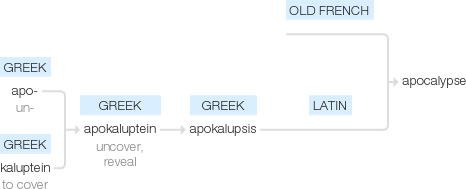Apocalypse
Old English, via Old French and ecclesiastical Latin from Greek apokalupsis, from apokaluptein ‘uncover, reveal’, from apo- ‘un-’ + kaluptein ‘to cover’.
wiktionary
From Middle English apocalips, from Latin apocalypsis, from Ancient Greek ἀποκάλυψις(apokálupsis, “revelation”), literally meaning " uncovering", from ἀπό(apó, “after”) and καλύπτω(kalúptō, “I cover”).
etymonline
apocalypse (n.)
late 14c., "revelation, disclosure," from Church Latin apocalypsis "revelation," from Greek apokalyptein "uncover, disclose, reveal," from apo "off, away from" (see apo-) + kalyptein "to cover, conceal," from PIE root *kel- (1) "to cover, conceal, save." The Christian end-of-the-world story is part of the revelation in John of Patmos' book "Apokalypsis" (a title rendered into English as pocalipsis c. 1050, "Apocalypse" c. 1230, and "Revelation" by Wyclif c. 1380).
Its general sense in Middle English was "insight, vision; hallucination." The meaning "a cataclysmic event" is modern (not in OED 2nd ed., 1989); apocalypticism "belief in an imminent end of the present world" is from 1858. As agent nouns, "author or interpreter of the 'Apocalypse,'" apocalypst (1829), apocalypt (1834), and apocalyptist (1824) have been tried.
